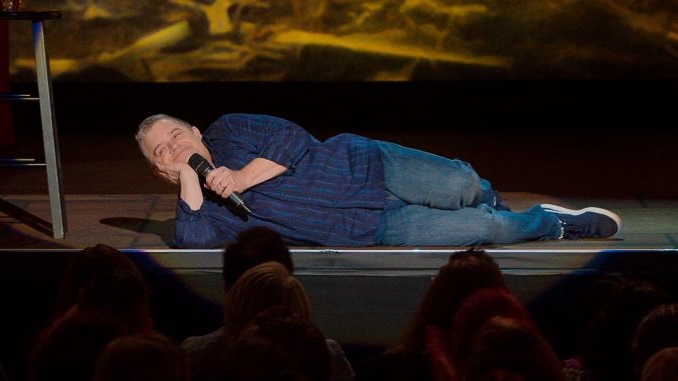We All Politely Applaud for Patton Oswalt’s Middling New Stand-up Special
Photo courtesy of Netflix
Patton Oswalt has always seemed like a smart, well-meaning, empathetic guy, but I still got nervous when he first uttered the word “woke” about three quarters of the way through his new Netflix special We All Scream. Was he about to reveal himself to be yet one more comedian of his era who disappears up his own ass while complaining about “cancel culture”—or, as it should be called, “reasonable criticism that almost never actually hurts anybody’s career”? It wouldn’t be a complete surprise, since the 53-year-old comedian took some social media hits after doing a set with his old friend Dave Chappelle this past New Year’s Eve; honestly, it wouldn’t be a surprise simply because Oswalt is a 53-year-old comedian.
Oswalt’s “woke” material isn’t the kind of knee jerk aggression and condescension we’ve come to expect from comedians of a certain age. For him the butt of the joke isn’t whoever might be offended by poorly considered jokes that punch down at vulnerable members of society—you know, the kind of anti-“woke” comedy that Dave Chappelle and Ricky Gervais have embarrassingly engaged in for years now. Oswalt instead targets the anti-“woke” by essentially calling them old and out of touch, albeit in a way that tries not to offend them, either. His whole framing is that “woke” ages poorly—that anybody who lives long enough will become confused and put off by evolving mores and changing definitions of normalcy.
It’s obvious that Oswalt is trying to address one of the major cultural issues of the day—one that’s especially germane to his career of stand-up—in a way that won’t insult or criticize anybody. That just makes it all so toothless, misguided, and unnecessary. He wants to say something without saying anything, but in the process of constructing an absurd possible future that would prove his point—one in which it’s legal for people to fuck their clones—he effectively depends on a strawman argument that demeans the LGBTQIA community’s justified complaints about comedians like Chappelle. Oswalt doesn’t name anybody or get into any specifics, but this bit still reads like an attempt to explain and thus somewhat absolve comedians who have used their recent sets to insult at-risk individuals who are already discriminated against and endangered by today’s society. I think it’s clear that’s not really Oswalt’s intention, and I don’t think he has any problems with the LGBTQIA community or any desire to make fun of them, but his attempt to navigate this thorny issue simply doesn’t work. It’s also not particularly funny.
Fortunately there’s a solid 50 or so other minutes in We All Scream, most of which come before that detour. Oswalt still has the charm and the skill with language that has always been the backbone of his stand-up; his comedy is less about the uniqueness of his observations and more about how he vocalizes and performs them. He’s comfortable on stage and after eight or so comedy specials his audience is equally comfortable with him, making the hour feel something like reconnecting with an old friend.
-

-

-

-

-

-

-

-

-

-

-

-

-

-

-

-

-

-

-

-

-

-

-

-

-

-

-

-

-

-

-

-

-

-

-

-

-

-

-

-








































